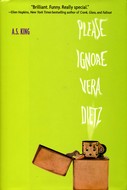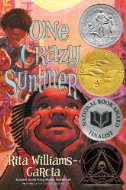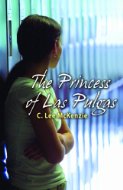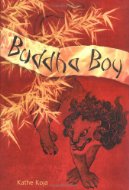 Pearce, Jackson. Sisters Red. New York: Little, Brown and Company, 2010. Print.
Pearce, Jackson. Sisters Red. New York: Little, Brown and Company, 2010. Print.[Book cover credit: librarything.com/work/8547268]
Booktalk:
"Versteck euch!" Oma March whispered hoarsely, pointing urgently toward her bedroom in the back of the cottage. Hide. Hide now.But Pa Reynolds didn't make it in time, changing the lives of Oma March's granddaughters, Rose and Scarlett, forever.
...
"Schatzi, my treasures, I won't let him have you!" Oma March murmured under her breath, like a prayer. She dashed for the telephone and began dialing.
"Charlie? Charlie, one is here. Outside," Oma March whispered frantically to Pa Reynolds, the woodsman who lived down the road. "Oh god, Charlie, hurry," she pleaded.
p.4-5
Review:
Everyone was raving about Sisters Red when it came out last year, and I, ever the cynic, figured no book could live up to that much hype. So I skipped it. Even though it's a fairytale retelling of sorts. Even though it's a fairytale retelling of Little Red Riding Hood.
Sometimes I'm dumb.
Luckily, I'm willing to admit my mistakes, so when I overheard someone in the bookstore telling her friend how much she loved this book, I snuck up and grabbed a copy for myself. By "myself" I mean "my library,"* but Sisters Red is a book I would gladly spend my own cash monies on. I loved it, and my gushing while reading has already prompted a holds list, which is pretty unusual for a YA novel in my academic library. Here are just a few of the things I was gushing about:
- Scarlett is so tough. She's deadly with a hatchet and harshly truthful and fiercely loyal and secretly proud of while being secretly self-hating because of her many battle scars. She feels overwhelmingly obligated to do the work that she does, and she's good at it. She's generally kick-ass.
- Rose is so conflicted. She wants Scarlett to trust her to hunt alone, but she also wants Scarlett to need and protect her. She wants to remain half of a pair, but she also wants to break away into a different life. She's got wicked aim with throwing knives, and she holds Scarlett together when no one else can. She's generally kick-ass.
- Silas is quite literally the boy next door. As such, he's managed to win the crushes of both Scarlett and Rose over the years. But he is first and foremost Scarlett's partner; they are a team and they act like one. He also manages to be first and foremost Rose's support. He pushes Scarlett to trust Rose on the hunt, and he pushes Rose to break away from hunting and live her own life. And he does all of this without being two-faced or playing one sister against the other. He totally gets that no matter how much Rose might swoon over him or how much Scarlett depends on him, he will never be able to compete with the relationship Scarlett and Rose have with each other. So he doesn't try.
- The twist that Pearce puts on werewolf mythology is great. They're still totally evil people-eaters (unlike some other werewolves you may be familiar with), but they're not the werewolves of B-rated horror films (or Harry Potter) either. How she weaves the girl in the red riding hood into this mythology made me giddy. She's created a werewolf that is, a lot of the time, victim to his own senses and sensations. In showing how Scarlett and Rose manipulate these monsters, she completely immerses the readers in a rich fantasy: the one that Scarlett and Rose (with help from Silas) nightly create.
- None of this compares to the twist Pearce has put on the ending of her own story. I thought I had it figured out about halfway through the book, then I lost it, then I figured it out again, but by then things were so complicated that I didn't know how Scarlett, Rose, and Silas were going to pull it off.
Seriously guys, I loved this book. The opening hook worked like a charm, and by the end, I was reading with my heart in my throat. I was so invested in these characters. Pearce's second book, Sweetly, came out last month. I will not be skipping it.
Book source: bought it for and then checked it out from work!
* And, of course, i couldn't just get one book... They'll never let me out with the library credit card again.
Links to Amazon.com may be affiliate links for the Amazon Associates program. If you buy something through this link, I may receive a referral fee.
















